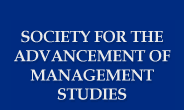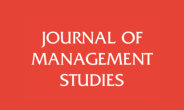‘Meaningful Work: Prospects for the 21st Century’
Submission Deadline: 3rd March 2017
Guest Editors:
Catherine Bailey, University of Sussex
Adrian Madden, University of Greenwich
Ruth Yeoman, Oxford University
Marc Thompson, Oxford University
Neal Chalofsky, George Washington University
Marjolein Lips-Wiersma, Auckland University of Technology
BACKGROUND TO THE SPECIAL ISSUE
Scholars from across the social sciences have often argued that meaningful work is the job characteristic that individuals value the most (Grant, 2007; 394; Harpaz and Fu, 2002). Meaningful work is even regarded by some as a fundamental right (Frankl, 1959; Yeoman, 2014). In contrast, meaningless work, has been described as alienating, disengaging and disenfranchising (Nair and Vohra, 2009; Shantz et al., 2014). Despite the level of interest in the topic, a recent systematic review showed that the literature remains fragmented, and that surprisingly few empirical studies have been conducted (Rosso et al, 2010). For instance, although sociologists have identified a range of different meanings that work can hold for individuals (Budd, 2011), they have been less concerned with meaningfulness. Psychologists have included experienced meaningfulness as a dimension within models of job design for many years (Hackman and Oldham, 1976), but the measures available to evaluate meaningfulness have been described as imprecise and self-referential (Lips-Wiersma and Wright, 2012). Political theorists have argued that meaningful, dignified and worthwhile work fulfils a human need (Yeoman, 2014), yet lack empirical data.
With employment becoming more precarious, demanding and increasingly characterised by self-employment, short-term contracts and unpaid work, organisations face complex challenges to make work meaningful to individuals and groups. Some argue there is a crisis of meaning and purpose as a consequence of failing to connect to the economic, social and environmental challenges of our time (Castillo, 1997). If people still aspire to work which is useful, interesting, expressive, or in some other way valuable, worthwhile and dignified, this raises questions about how we arrange economic and organisational practices to promote such work. As economies struggle with the pressures of recession and competition, are there limits to the impact that workplace strategies can have on human motivation and human flourishing? The answers to these questions are not just ‘nice to have’; some regard them as vital to social and individual well-being.
In light of the emerging limitations of prevailing discourses such as work engagement to explain human behaviour and experience at work (Bailey et al., 2015 in press), attention is now turning to other, more nuanced and holistic experiences, such as meaningfulness, that take account of the whole person within a multi-layered organizational and institutional setting. This presents a challenge to moral philosophy and critical social theory which treat work as a degraded site for human action, and for liberal political theory which makes the negative freedom to enter and exit from the employment relation sufficient for an account of work. Finally, the inadequacies of present theoretical and empirical approaches to describing and evaluating meaningful work are made evident by compelling epidemiological research on the negative impact of poor quality work upon health outcomes with consequent individual and societal costs (Bambra, 2011). This empirical evidence has not yet been fully been incorporated into new forms of job design, nor has it influenced theories of social justice through a public examination of the centrality of work in modern societies. Understanding and developing our conceptual and empirical knowledge of what meaningfulness is also necessitates taking account of the variety and nature of work. Work can be paid and unpaid, formal or informal carried out in conditions of freedom or compulsion. Modern forms of slave labour have been used to build important infrastructure in developing economies, which improves the lives of many people. In some cultures (for example, India) a caste system has developed around certain types of work (building, sewage etc). Do the institutional norms in certain contexts legitimate such work, confer meaning, and make such work meaningful to the people doing it? How does this align with global standards and norms around work (e.g. the Decent Work campaign by the ILO?) and what are the implications for cross-cultural management? What are the interconnections between meaningfulness across life domains (paid/unpaid work; personal life etc)? Work is also becoming more virtual and spatially disconnected. Workers are collaborating globally in production systems where they never meet other co-producers or engage with customers. How is meaningfulness created and sustained in such contexts? What are the implications of these new modes of working for meaningful work?
TYPES OF SUBMISSIONS SOLICITED
The purpose of this special issue is to call for papers focusing on meaningful work within the context of the latest stage in capitalist development where technology, global markets, financialisation and increasing instability are interacting to create intense pressures on how work is organised and experienced.
Articles that approach the topic at a theoretical and empirical level, and from a variety of social science perspectives are encouraged, including sociological, psychological, philosophical or political economy viewpoints. Studies that seek to provide integrative, inter-disciplinary explanations are especially welcome. In particular, we seek papers that address the following issues:
- Empirical studies of the experience of meaningful work from the individual perspective, including explorations of the association between meaningfulness and aspects of diversity and intersectionality, or from workers in different types of occupations. Cross-cultural comparative studies would also assist with theorizing meaningful work.
- Studies that explore meaningful work in different ownership and governance contexts (e.g. employee owned firms, social enterprises, NGOs etc).
- Articles that shed new theoretical light on meaningfulness, notably those that draw on and develop integrative frameworks from multiple disciplines. These may include papers which examine the value of meaningfulness from the perspective of moral philosophy and critical social theory, as well as from the perspective of political economy as morally worthy, or worthwhile work.
- Explorations of organizational programmes and interventions aimed at shaping the experience of meaningfulness, such as HRM policies and practices, leadership styles or organizational contexts, notably those adopting a critical perspective.
- Corporate responsibility is argued to attract a high quality workforce and lead to higher employee commitment because it creates meaningful work. At the same time “the effective delivery of corporate social and environmental responsibility initiatives is dependent on employee responsiveness” (Collier and Esteban, 2007:22). This suggests that the relationship between corporate responsibility and meaningful work is complex and interdependent rather than linear. We invite studies that explore the relationship between meaningful work, employee participation and social and environmental corporate responsibility.
- Studies that examine the interface between workplace spirituality and meaningfulness, between callings and meaningfulness, between meaningfulness and the concepts of purpose, passion and engagement, or those that explore the individual’s role as crafter of meaning.
- Studies that explore meaningfulness in relation to well-being both inside and outside work.
- Papers that consider the changing structure, process and context of work and its link with meaningfulness, particularly studies that explore precarious work and its structure of low wage and skills, instability/insecurity, intensity, and vulnerability.
- Papers that address the question of how institutional environments influence the quality and meaningfulness of work and how these macro-level factors interact with meso-level workplace regimes and individual experiences. These may include studies which evaluate the public policies (e.g. Good Work Indices) needed to establish the institutional conditions for promoting meaningful work.
- Studies that consider meaningful work within a framework of rights, values and ethics and that consider the normative value of meaningful work. For liberal political theorists, organizing society to promote the good of meaningful work entails a challenge to the ideal of liberal neutrality where the state remains neutral between different conceptions of living (ibid.). For political economy, organizing for meaningful work implies that choices can be made between different forms of capitalism where promoting the value of meaningfulness becomes one of the decision criteria (Keat, 2009). Promoting the value of meaningfulness in system of rights, values and ethics would imply, minimally, not inhibiting a person’s search for meaning and, substantively, the creation of independently valuable objects of action (Yeoman, 2014)
- Studies that explore meaningfulness in relation to concepts such as identity and professionalism. These may draw upon the moral and political philosophy literature on self-identity formation and social recognition, as well as upon organizational studies. An underexplored theme is how work may be experienced as more or less meaningful in the interaction between human actors and materiality
- Research from an organizational level perspective that engages with organizational purpose and its relation to meaningfulness at work. Collins and Porras’ (1997) work, for example, on firms with sustained success pointed to the importance of purpose and values. How are the two related, and are they mutually necessary to sustain meaningful work?
- Studies that explore how research methodologies can produce fresh insights and debates into meaningful work and the subjective/objective conditions in which it arises.
CONFERENCE ON MEANINGFUL WORK
This special issue is linked to a conference to be held at the Auckland University of Technology (AUT) in New Zealand 30 November – 1 December 2016, entitled “Meaningful Work: Prospects for the 21st Century”. Further information about the conference will be available soon. Presentation at the conference does not guarantee acceptance of the paper for publication, and attendance is not a prerequisite for publication in the special issue.
SUBMISSION PROCESS AND DEADLINES
- Papers will be reviewed according to the JMS double-blind review process.
- Submissions should be prepared using the JMS Manuscript Preparation Guidelines: Click Here to View
The deadline for submissions is 3rd March 2017.
- Manuscripts should be submitted by e-mail to the guest editors at the following address: k.bailey@sussex.ac.uk and copied to a.madden@greenwich.ac.uk
- Informal enquiries relating to the Special Issue, proposed topics and potential fit with the Special Issue objectives are welcomed. Please direct any questions to the guest editors at the e-mail addresses above.

